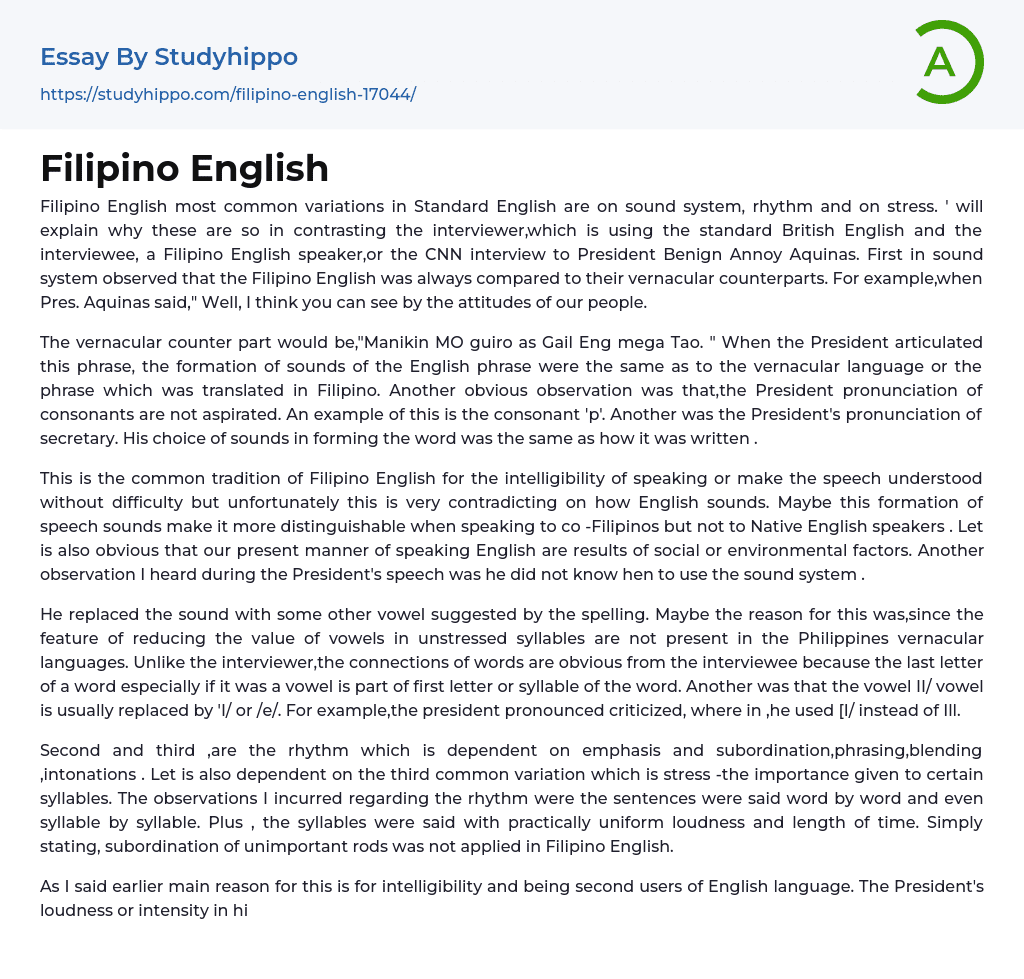Filipino English most common variations in Standard English are on sound system, rhythm and on stress. ' will explain why these are so in contrasting the interviewer,which is using the standard British English and the interviewee, a Filipino English speaker,or the CNN interview to President Benign Annoy Aquinas. First in sound system observed that the Filipino English was always compared to their vernacular counterparts. For example,when Pres. Aquinas said," Well, I think you can see by the attitudes of our people.
The vernacular counter part would be,"Manikin MO guiro as Gail Eng mega Tao. " When the President articulated this phrase, the formation of sounds of the English phrase were the same as to the vernacular language or the phrase which was translated in Filipino. Another obvious observation was that,the President pronunciation of co
...nsonants are not aspirated. An example of this is the consonant 'p'. Another was the President's pronunciation of secretary. His choice of sounds in forming the word was the same as how it was written .
This is the common tradition of Filipino English for the intelligibility of speaking or make the speech understood without difficulty but unfortunately this is very contradicting on how English sounds. Maybe this formation of speech sounds make it more distinguishable when speaking to co -Filipinos but not to Native English speakers . Let is also obvious that our present manner of speaking English are results of social or environmental factors. Another observation I heard during the President's speech was he did not know hen to use the sound system .
He replaced the sound with some other vowel suggested by the spelling. Maybe the reason
for this was,since the feature of reducing the value of vowels in unstressed syllables are not present in the Philippines vernacular languages. Unlike the interviewer,the connections of words are obvious from the interviewee because the last letter of a word especially if it was a vowel is part of first letter or syllable of the word. Another was that the vowel II/ vowel is usually replaced by 'I/ or /e/. For example,the president pronounced criticized, where in ,he used [I/ instead of Ill.
Second and third ,are the rhythm which is dependent on emphasis and subordination,phrasing,blending ,intonations . Let is also dependent on the third common variation which is stress -the importance given to certain syllables. The observations I incurred regarding the rhythm were the sentences were said word by word and even syllable by syllable. Plus , the syllables were said with practically uniform loudness and length of time. Simply stating, subordination of unimportant rods was not applied in Filipino English.
As I said earlier main reason for this is for intelligibility and being second users of English language. The President's loudness or intensity in his speech didn't vary compared to what the interviewer did . His emphasis on the words like heightening the tone or pitch and increased of duration or the so called intonation are barely observed. His phrasing or the grouping of words to convey a thought which is dependent mainly on the meaning and intent was not given importance unlike the interviewer.
The interviewee ,articulated every word as important as the other and no interrelations. The prominence given to a word base on its meaning is barely heard. The blending
of the sentence rhythm of the president is not smooth unlike the British interviewer. Third , the stressing of syllable or what is known as accent ,varies completely from both the interviewer and interviewee. The President pronounce each syllable separately with a more or less even accent. The interviewee's intonation sometimes begin high on the accented syllables then falls.
Pitch are barely observed from the President while the interviewer articulation has really put an emphasis on pitch levels . Based from my observations by contrasting it to Britain English, I therefore conclude that the variation of Filipino English is almost 80% different. The president's responses were plainly the counterpart of vernacular language either regarding sounds,rhythm and stress.
Sources
- Martinez,Norma. Standard Filipino English Pronunciation. Racial: Novas Press, 1975. Alonzo, Terror. Standard Filipino English. Manila :Atone University Press,1969.
- Academia essays
- Higher Education essays
- Language Learning essays
- Studying Business essays
- Education System essays
- Study essays
- First Day of School essays
- Scholarship essays
- Pedagogy essays
- Curriculum essays
- Coursework essays
- Studying Abroad essays
- Philosophy of Education essays
- Purpose of Education essays
- Brainstorming essays
- Educational Goals essays
- Importance Of College Education essays
- Brown V Board of Education essays
- The Importance Of Higher Education essays
- Online Education Vs Traditional Education essays
- Academic And Career Goals essays
- Academic Integrity essays
- Brown Vs Board Of Education essays
- Distance learning essays
- Technology in Education essays
- Vocabulary essays
- Writing Experience essays
- Importance of Education essays
- Early Childhood Education essays
- Academic Degree essays
- Academic Dishonesty essays
- School Uniform essays
- Academic writing essays
- Cheating essays
- Bachelor's Degree essays
- MBA essays
- College Life essays
- Grade essays
- Diploma essays
- Phonology essays
- Sentence essays
- Filipino Language essays
- Pragmatics essays
- Millennium Development Goals essays
- History Of Education essays
- Graduate School essays
- Middle School essays
- School essays
- Special Education essays
- University essays




